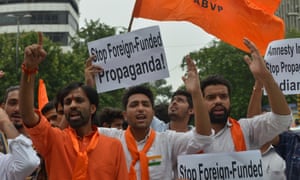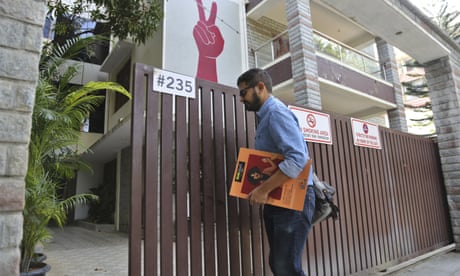NGOs say they could be forced to leave India after authorities freeze their bank accounts
Michael Safi in Delhi

Global charities have said their operations in India are in danger after the government froze their bank accounts, forcing them to shed staff.
Amnesty International and Greenpeace have accused India of launching a “smear campaign” against NGOs, activists and journalists critical of the government.
Amnesty’s Indian operation is in the midst of a sustained crackdown by the country’s home ministry that has cut the group off from its bank accounts and forced it to shed nearly 70 employees, with many senior leaders now working on a voluntary basis.
Greenpeace India has also been targeted for investigation by authorities in past weeks and could leave the country altogether. Activists say it is an extension of a wider campaign against human rights groups in India that has seen nearly 20,000 local NGOs deregistered since 2014.

Amnesty says tax raid at its Indian office is assault on civil society
“We’ve had to downsize substantially,” said Smriti Singh, the media and advocacy manager at Amnesty International India. “Senior management are going through an exercise to see how we can operate with the minimum we have.”
The London-based membership organisation, which has been in India since 1966, has cut its workforce by 68 people since late October when its Indian headquarters in Bengaluru were raided by tax authorities.
India’s Enforcement Directorate (ED) has claimed Amnesty’s Indian branch is illegally receiving foreign money.Advertisement
Amnesty has been denied a licence to bring in money from overseas under India’s stringent Foreign Contribution (Regulation) Act, established in the 1970s when leaders feared the US Central Intelligence Agency and other groups might try to fund civil society groups to foment dissent in the country.
Though it cannot receive foreign donations, Amnesty has set up a private company which sells the group’s human rights education toolkit to Amnesty branches overseas, part of which is then used to fund Indian advocacy, alongside dues from local members.
Amnesty says the arrangement, which is common in countries where foreign funding is closely scrutinised, has been disclosed on its website for years and is “fully compliant with Indian laws and regulations”.
Its bank accounts were frozen after the ED raid and a judge has permitted access only to funds donated by members since 26 October.

Sensitive details about the investigation were leaked last month to Times Now, a stridently nationalist Indian news channel, which ran an hour-long “super exclusive”report detailing the ED’s allegations.
Amnesty has said the leak was part of a “smear campaign” and has organised protests across several Indian cities as well as outside India’s high commission in London.
Greenpeace India had its licence to bring foreign donations into India cancelled in 2015, and had to shrink its organisation by 30%. In October, it also had some bank accounts frozen, limiting access even to its Indian funds.
Closing Greenpeace’s India office was now “a scenario we can’t rule out”, said Nandikesh Sivalingam, the group’s campaign manager for climate and energy.
He said Greenpeace and Amnesty were visible targets because they were international and urban-based, but that the scrutiny on them was part of a wider campaign against NGOs, activists and critical journalists in a country that boasts it is the world’s largest democracy.
“It’s about how the government perceives dissent in our country,” Sivalingam said.
Foreign funding of charities is a highly sensitive issue in India and often cast in sinister terms as a tool of overseas governments to stifle India’s economic growth or stoke social instability.
More than 19,000 NGOs have been blocked from receiving funds from overseas for violations ranging from not filing the appropriate paperwork to engaging in “activities not conducive to the national interest” under the Narendra Modi government. It claims to have reduced the total flow of foreign funds from £1.6bn in 2014 to £691m last year.
In 2014, an intelligence report was leaked to the media accusing NGOs of reducing India’s GDP by 2-3% each year by campaigning against mining and other projects.
One of India’s largest foreign charities, the Christian aid group Compassion International, ended its 40-year operations in the country last year because it could no longer use overseas funds.
The Indian government accused the group of conducting spiritual activities, a highly sensitive issue in a country that was sought after by British missionaries in the colonial era, and more recently by American evangelical groups, as a source of new Christians.
Since its accounts were frozen, Amnesty has published a report on the “inhumane conditions” inside foreigners’ detention camps in the north-east border state of Assam, but said progress on future investigations would be severely slowed.
“We don’t know if our accounts will ever be opened again,” Singh said. “We hope justice will reign but we can’t put a timeline to it.”
December 27, 2018 at 7:13 pm
The operations of NGOs like Greenpeace have been greatly affected by the intimidation policies